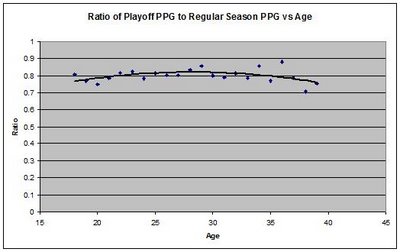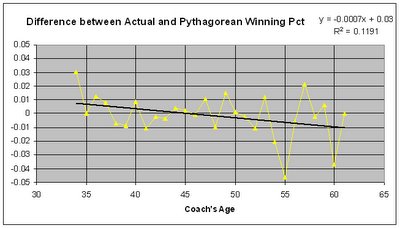Thursday, April 23, 2009
Playoff Performance by Age
There's no question that scoring rates drop during the playoffs, but James Mirtle wonders if it's fair to count "every game as being equal, whether those postseason games were played as an 18-year-old rookie, 27-year-old sniper or a 37-year-old greybeard..."
At first glance, it seems like a reasonable thing to do. The ratio between playoff and regular season scoring is shown below for ages 18-40:

And it's incredibly rare to play in the playoffs at either an old or young age - 94% of players in the playoffs are between 20 and 34 on January 1st of a given season. A linear fit indicates no relationship between age and scoring ratio, while a polynomial fit indicates a slight difference. Counting all games as equal seems like the right thing to do.
At first glance, it seems like a reasonable thing to do. The ratio between playoff and regular season scoring is shown below for ages 18-40:

And it's incredibly rare to play in the playoffs at either an old or young age - 94% of players in the playoffs are between 20 and 34 on January 1st of a given season. A linear fit indicates no relationship between age and scoring ratio, while a polynomial fit indicates a slight difference. Counting all games as equal seems like the right thing to do.
Wednesday, April 16, 2008
How does an NHL coach's age affect his performance?
Thanks to hockey-reference.com's new and better-organized data, I was able to hammer out a project I've been thinking about for months in about half an hour yesterday. I read a baseball article about managerial aging patterns and I wanted to see what role a coach's age played in the NHL.
What I did was as follows: at each age, I totaled the number of points a coach's team got in the standings and compared that to the number of points we would have expected based on their goals for and against. The idea is that coaches reach some peak performance level where they can get their teams to produce better results than what their raw goal differential would suggest. No one has ever coached an NHL team at age 25 or age 70, so clearly there is skills growth and decline among the coaching population.
The dataset starts in 1967 and ends in 2004 (because goal totals post-lockout include phantom SO winners.) This chart shows that delta on a per game basis:

One thing that's obvious is that once coaches reach their mid-fifties they can potentially fall off a cliff. Beyond age 61, coaching is really the exclusive province of Scotty Bowman and Roger Neilson. But for the bulk of their careers - age 35 to 53, which accounts for 86% of all games coached - there is, to my eye, and my spreadsheet, no discernible trend. The only thing I see is that coaches aged 54-61 accounted for 10% of games coached despite the variation in their performance, which suggests that legendary coaches are allowed to stay on until they run their teams into the ground, rather than being asked to retire at the beginning of their decline phase.
What I did was as follows: at each age, I totaled the number of points a coach's team got in the standings and compared that to the number of points we would have expected based on their goals for and against. The idea is that coaches reach some peak performance level where they can get their teams to produce better results than what their raw goal differential would suggest. No one has ever coached an NHL team at age 25 or age 70, so clearly there is skills growth and decline among the coaching population.
The dataset starts in 1967 and ends in 2004 (because goal totals post-lockout include phantom SO winners.) This chart shows that delta on a per game basis:

One thing that's obvious is that once coaches reach their mid-fifties they can potentially fall off a cliff. Beyond age 61, coaching is really the exclusive province of Scotty Bowman and Roger Neilson. But for the bulk of their careers - age 35 to 53, which accounts for 86% of all games coached - there is, to my eye, and my spreadsheet, no discernible trend. The only thing I see is that coaches aged 54-61 accounted for 10% of games coached despite the variation in their performance, which suggests that legendary coaches are allowed to stay on until they run their teams into the ground, rather than being asked to retire at the beginning of their decline phase.
Labels: Aging, Coaching, Hockey-reference
Subscribe to Posts [Atom]
